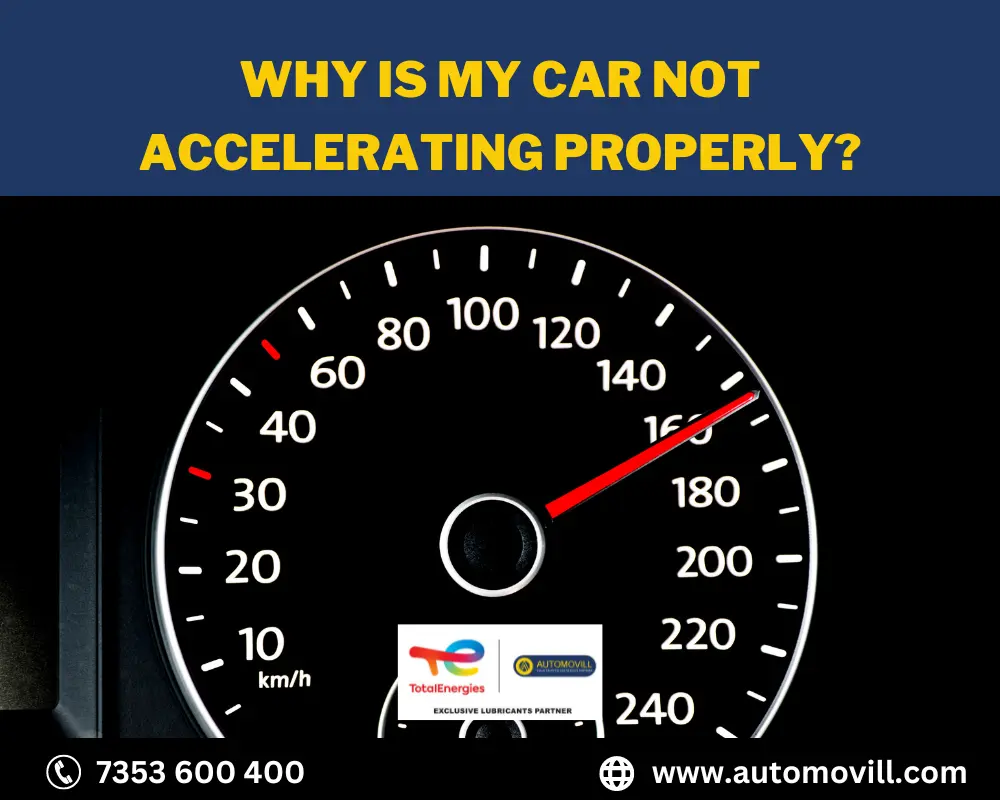
A car that fails to accelerate properly can be frustrating and potentially dangerous. Whether it’s sluggish acceleration or a complete lack of power, there are various factors that can contribute to this issue.
In this blog, we will get to know some common reasons why your car is not accelerating properly.
If you notice those causes, you can take timely action or seek help from a skilled mechanic to resolve the problem and get your car back to its optimal performance.
5 Causes Why Car Is Not Accelerating
Here we go:
1. Fuel System Issues
One of the primary culprits behind poor acceleration is a problem with the fuel system. A fuel system consists of 3 components i.e. Fuel filter, Fuel Pump, and Fuel Injector. If any one of them is faulty may cause issues in accelerating.
A clogged fuel filter reduces the flow of fuel to the engine and hence reduces its ability to generate power.
A malfunctioning fuel pump may not supply adequate fuel pressure, causing sluggish acceleration.
A dirty or clogged fuel injector disrupts the precise fuel-air mixture required for combustion, resulting in reduced power output. Fuel injectors should be cleaned at regular intervals to ensure optimal performance. You can read the symptoms of clogged fuel injectors here.
2. Faulty Oxygen Sensor
The function of the oxygen sensor is to check how much oxygen is in the exhaust gases. It then sends this information to the car’s computer. Then the computer uses that information to adjust the amount of fuel and air going into the engine, making sure it’s just right for efficient combustion.
So, if the oxygen sensor is faulty, it messes up the fuel and air balance in your engine, leading to reduced or sluggish acceleration. So, it’s important to have a properly functioning oxygen sensor to ensure your car runs smoothly and efficiently.
3. Ignition System Problems
The ignition system plays a crucial role in delivering the spark necessary for combustion. If any component within the ignition system malfunctions, it can lead to poor acceleration. A worn-out spark plug or a faulty ignition coil may cause misfires, resulting in reduced engine power. Regularly inspecting and replacing spark plugs can improve acceleration.
Moreover, a malfunctioning ignition timing system can disrupt the synchronization between the spark plug firing and the engine’s cycle, negatively impacting acceleration. Ignition timing should be adjusted according to the manufacturer’s specifications to ensure optimal performance.
4. Transmission Troubles
Problems within the transmission can also contribute to poor acceleration. A worn-out clutch in a manual transmission or a slipping automatic transmission can prevent the power generated by the engine from effectively reaching the wheels. This leads to decreased acceleration and may require repairs or replacement of the clutch or transmission components.
Low transmission fluid levels or a faulty torque converter can also impact acceleration. Regular maintenance, including checking fluid levels and changing the transmission fluid at recommended intervals, can help prevent such issues.
5. Engine Mechanical Problems
Various mechanical issues within the engine can hamper acceleration. These include a worn-out timing belt or chain, damaged piston rings, or a malfunctioning valve train. These problems can disrupt the engine’s performance and result in reduced power output. Regular engine maintenance, including timely replacement of components, can help avoid such issues.
6. Faulty Throttle Position Sensor
In some cases, acceleration issues may be caused due to a faulty throttle position sensor or mass airflow sensor, which affects the fuel-to-air ratio and subsequently hampers acceleration. Regular maintenance and timely replacement of these components can prevent such problems.
Conclusion
When your car is not accelerating properly, it’s important to diagnose the problem correctly to implement the appropriate solution. Fuel system issues, ignition system problems, transmission troubles, and engine mechanical problems are common culprits that can cause poor acceleration.
Regular car service, timely replacement of components, and seeking mechanic assistance when necessary are essential for maintaining a well-functioning car.
Remember, identifying and repairing the root cause as soon as possible, not only improves performance but also avoids the big damage to the engine.
